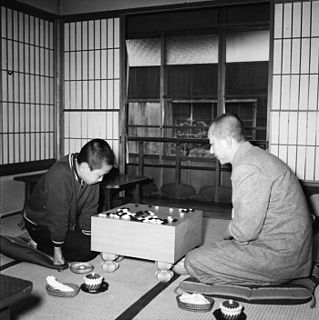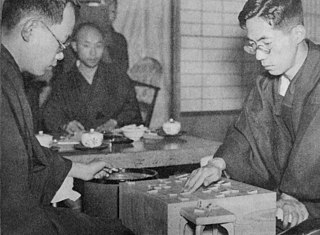Related Research Articles

Hudson's Adventure Island, known as Takahashi Meijin no Bōken Jima in Japan and also known as Adventure Island, is a side-scrolling platform game produced by Hudson Soft that was released in Japan for the Famicom and MSX on September 12, 1986. Adventure Island was released in North America for the Nintendo Entertainment System in 1988 and in the PAL region in 1992.
Masao Kato Honorary Oza, also known as Kato Kensei, was a Japanese professional go player. A late bloomer, Kato won 46 titles, including the Oza eight times in a row. He also became the second player to reach 1,200 career wins, behind Rin Kaiho.

Cho Chikun25th HoninboHonorary Meijin is a professional South Korean Go player and a nephew of Cho Namchul. His total title tally of 75 titles is the most in the history of the Japanese Nihon Ki-in. Cho is the first player to hold the top three titles—Kisei, Meijin, and Honinbo—simultaneously which he did for three years in a row. Cho is the first in history to win all of the "Top 7" titles in Japan which he achieved by winning the Oza in 1994. Cho U in 2011 and Iyama Yuta in 2013 would duplicate this feat, both by winning the Kisei. He is also one of the 'Six Supers' Japanese players that were most celebrated in the late twentieth century, along with Rin Kaiho, Otake Hideo, Takemiya Masaki, Kato Masao and his classmate and arch-rival Kobayashi Koichi. He is the author of several books on Go.

Rin Kaihō or Lin Haifeng is a professional Taiwanese Go player who made his name in Japan. He is, along with Cho Chikun, Kobayashi Koichi, Otake Hideo, Takemiya Masaki and Kato Masao, considered one of the 'Six Supers' that dominated Japanese Go world in the last three decades of the twentieth century.
Cho U is a Taiwanese professional Go player. He currently ranks 6th in the most titles won by a Japanese professional; his NEC Cup win in 2011 put him past his teacher Rin Kaiho and Norimoto Yoda. Cho is the first player in history to have held five of the top seven major titles simultaneously with Iyama Yuta being the second. Cho U, Naoki Hane, Keigo Yamashita and Shinji Takao make up the group of players in Japan called the "Four Heavenly Kings". His wife is one of Japan's best female go professionals, Izumi Kobayashi, the great Kitani's granddaughter and daughter of Kobayashi Koichi.

Eio Sakata was a 9-dan Japanese professional Go player.

Yuta Iyama Kisei, Honinbo, Meijin is a Japanese professional Go player. In April 2016, he became the first player in Japanese history to hold all seven major titles simultaneously. In January 2018, Iyama became the first professional Go player to be awarded Japan's People's Honour Award.
The Women's Meijin (女流名人戦) is a Go competition. The Women's Meijin is the female version of the Meijin title. This title is sponsored by Fuji Evening Newspaper and Nippon Life Insurance. The winner's purse is 5,100,000 Yen ($48,000).
The 1st Kisei was the birth of a new Go tournament. Since this was the first year of the tournament, there was no set challenger or holder. From the 2nd edition on, there has been a playoff between challengers. At the time, it was the highest paying tournament there had ever been, and would be until the creation of the Ing Cup. Fujisawa Hideyuki's win would mark the beginning of a six-year defense of the Kisei title from 1977 to 1982.
The 32nd Kisei was held from January 2007 to 2008. The following players earned spots through not being eliminated in the group stage: Naoki Hane (4-1), Cho U (4-1), Kobayashi Satoru (4-1), Atsushi Kato (4-1), O Rissei (3-2) Hideki Komatsu (2-3), Norimoto Yoda (2-3), and Imamura Toshiya (2-3). Mimura Tomoyasu, Kunihisa Honda, Satoshi Yuki, and Cho Chikun were eliminated from group play and had to earn a spot through preliminary stages. The players who qualified through preliminary tournaments are Cho Chikun, Hiroshi Yamashiro, Shinji Takao, and Yuta Iyama. Players who ended with the two lowest records in the each league were eliminated from automatic berth into the next tournament while the 3 other players who were not eliminated or had the top record were given a place in the following year's groups.

Meijin (名人) is one of the eight titles in Japanese professional shogi, and is the most prestigious title, along with Ryūō. The word meijin refers to a highly skilled master of a certain field.
Takahashi Meijin, real name Toshiyuki Takahashi, is a former executive of Hudson Soft.
The 1st Meijin was the first Meijin title sponsored by Asahi Shimbun. The tournament used a nine player round robin league system. Hideo Otake won the last Old Meijin title and his title was honored as holder of the Meijin title. Shuchi Kubouchi, Takeo Kajiwara and Norio Kudo qualified through the preliminary stages while Yoshio Ishida, Hideyuki Fujisawa, Eio Sakata, Utaro Hashimoto, Rin Kaiho, Toshiro Yamabe retained their places from the 14th Old Meijin. Yoshio Ishida won the league and challenged Otake for the title. Otake won the title in five games.

Yasuharu Ōyama was a professional shogi player, 15th Lifetime Meijin and president of Japan Shogi Association. He studied shogi under Kinjiro Kimi. He won 80 titles, 44 other type tournaments and 1433 games in life, and was awarded five lifetime titles: Lifetime Meijin, Lifetime Jūdan, Lifetime Ōi, Lifetime Kisei and Lifetime Ōshō. Among his 80 titles, 18 were the Meijin title. He has appeared in the Meijin title match 25 times winning 18; he also holds the record for the most consecutive Meijin titles, the most overall Meijin titles, and being the oldest player to challenge for the Meijin title, at age 63 in 1986.
Hsieh Yimin is a Taiwanese-born professional Go player in Japan. She holds the titles of Honorary Female Honinbo and Honorary Female Meijin, and currently holds three major female titles in Japan: Female Meijin, Female Kisei and Female Honinbo.
Amahiko Satō is a Japanese professional shogi player, ranked 9-dan. He is a former Meijin title holder.
Masayuki Toyoshima is a Japanese professional shogi player, ranked 9-dan. He is a former holder of the Ryūō, Meijin, Ōi, Kisei and Eiō titles.

Akira Inaba is a Japanese professional shogi player, ranked 8-dan. Inaba, together with Tetsurō Itodani, Masayuki Toyoshima and Akihiro Murata, is one of four Kansai-based young shogi professionals who are collectively referred to as the "Young Kansai Big Four".

Akira Watanabe is a Japanese professional shogi player ranked 9-dan. He is the current holder of the Meijin, and Kiō major titles, and also a former holder of the Kisei, Ōshō, Ōza and Ryūō titles. He is also a Lifetime Kiō and a Lifetime Ryūō title holder.
References
- ↑ "GoBase.org - News archive". gobase.org. Retrieved 2022-10-10.
- ↑ "History of Topics 2006 | Nihon kiin". www.nihonkiin.or.jp. Retrieved 2022-10-10.